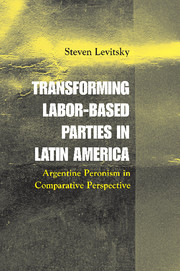Book contents
- Frontmatter
- Contents
- Figure and Tables
- Acknowledgments
- 1 Labor-Based Party Adaptation in the Neoliberal Era: Rethinking the Role of Party Organization
- 2 Origins and Evolution of a Mass Populist Party
- 3 An “Organized Disorganization”: The Peronist Party Structure in the 1990s
- 4 Populism in Crisis: Environmental Change and Party Failure, 1983–1985
- 5 From Labor Politics to Machine Politics: The Transformation of the Peronist Party–Union Linkage
- 6 Menemism and Neoliberalism: Programmatic Adaptation in the 1990s
- 7 A View from Below: Party Activists and the Transformation of Base-Level Peronism
- 8 The Paradox of Menemism: Party Adaptation and Regime Stability in the 1990s
- 9 Crisis, Party Adaptation, and Democracy: Argentina in Comparative Perspective
- References
- Index
1 - Labor-Based Party Adaptation in the Neoliberal Era: Rethinking the Role of Party Organization
Published online by Cambridge University Press: 22 December 2009
- Frontmatter
- Contents
- Figure and Tables
- Acknowledgments
- 1 Labor-Based Party Adaptation in the Neoliberal Era: Rethinking the Role of Party Organization
- 2 Origins and Evolution of a Mass Populist Party
- 3 An “Organized Disorganization”: The Peronist Party Structure in the 1990s
- 4 Populism in Crisis: Environmental Change and Party Failure, 1983–1985
- 5 From Labor Politics to Machine Politics: The Transformation of the Peronist Party–Union Linkage
- 6 Menemism and Neoliberalism: Programmatic Adaptation in the 1990s
- 7 A View from Below: Party Activists and the Transformation of Base-Level Peronism
- 8 The Paradox of Menemism: Party Adaptation and Regime Stability in the 1990s
- 9 Crisis, Party Adaptation, and Democracy: Argentina in Comparative Perspective
- References
- Index
Summary
The new world economic order has not been kind to labor-based political parties. Changing trade and production patterns, increased capital mobility, and the collapse of the Soviet bloc dramatically reshaped national policy parameters in the 1980s and 1990s. Traditional left-wing programs were discredited, and policies based on Keynesian and “import-substituting” models were increasingly dismissed as populist and inflationary. At the same time, long-term changes in class structure eroded the coalitional foundations of labor-based parties. The decline of mass production and expansion of the tertiary and informal sectors weakened industrial labor organizations, limiting their capacity to deliver the votes, resources, and social peace that had been the foundation of the traditional party-union “exchange.” These changes created an incentive for labor-based parties to rethink their programs, redefine their relationship with unions, and target new electoral constituencies. Such change is not easy. Because adaptive strategies generally run counter to parties' traditional programs and the perceived interests of many of their constituents, party leaders often prove unwilling or unable to carry out such strategies. Yet if they do not adapt, labor-based parties face the prospect of electoral decline and political marginalization. Party adaptation may have important implications for democracy. In Latin America, the failure of established labor-based parties to respond effectively to the economic crises of the 1980s and 1990s at times resulted in party system decomposition and the breakdown, or near breakdown, of democratic regimes.
By virtually any measure, the Argentine (Peronist) Justicialist Party (PJ) is a case of successful labor-based adaptation.
- Type
- Chapter
- Information
- Transforming Labor-Based Parties in Latin AmericaArgentine Peronism in Comparative Perspective, pp. 1 - 34Publisher: Cambridge University PressPrint publication year: 2003



